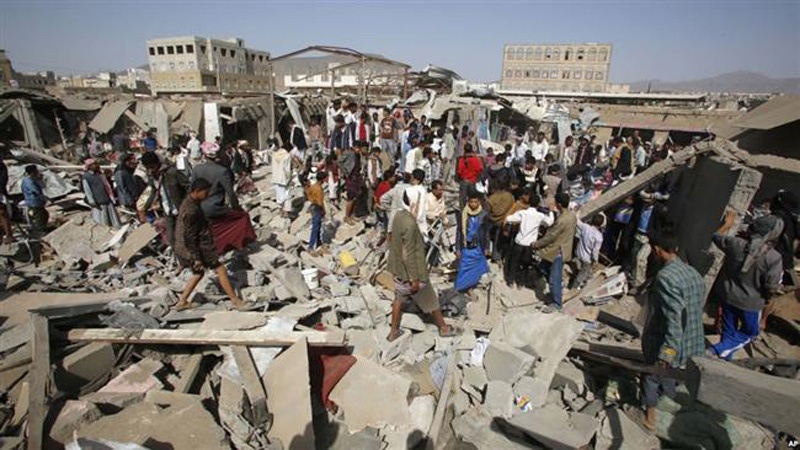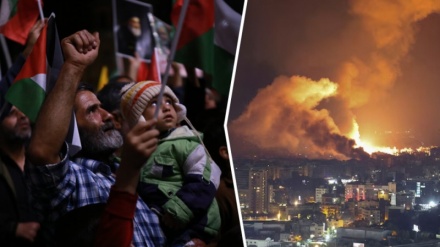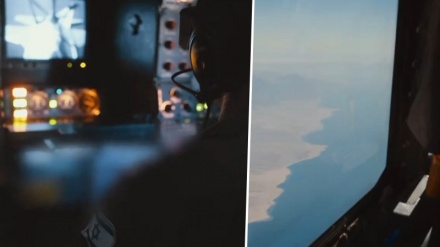Confidential UN report suggests Saudi-led coalition failing in Yemen
According to a confidential UN report the so-called Arab coalition assembled by Riyadh is falling apart regarding its assault on Yemen.
Despite the bragging by Saudi Arabia that it is making progress in the war it imposed two-and-a-half years ago on Yemen in a bid to defeat the popular Ansarallah Movement, the facts on the ground speak otherwise, and according to a confidential UN report the so-called Arab coalition assembled by Riyadh is falling apart. Here are the excerpts from the findings of Colum Lynch, UN-based senior diplomatic reporter.
For nearly two-and-a-half years, Saudi Arabia and its allies, equipped with American-built aircraft and precision-guided rockets, have prosecuted one of the most advanced airpower campaigns against one of the world’s poorest countries. But the Saudi-led coalition’s overwhelming military superiority has brought them no closer to victory. Instead, it has furthered Yemen’s political fragmentation, deepened a humanitarian crisis that has brought the country to the brink of famine, and fed widespread public resentment in response to high civilian casualties.
According to a confidential UN report reviewed by Foreign Policy: “The Saudi Arabia-led coalition strategic air campaign continues to have little operational or tactical impact on the ground, and is only serving to stiffen civilian resistance,”
According to a blunt verdict by a UN Security Council panel of experts, it is also helping to consolidate a military alliance between the Ansarallah Movement and Yemen’s former leader, Ali Abdullah Saleh, who control 13 of the country’s governorates, including the capital of Sana’a.
The disarray has provided a breeding ground for extremists such as al-Qaeda, which, the panel believes, “is looking to launch terrorist attacks against targets in the West.”
The report notes that al-Qaeda may be bolstering its ability to carry out attacks on sea vessels, citing the seizure of water borne explosive devices and a marine radar scanner in the terror group’s former stronghold of Mukalla. The panel noted: al-Qaeda local leader, Qasim ar-Raymi, recently released a video encouraging “lone wolf’ attacks against targets in the West.
It is clear that the fugitive Mansour Hadi is on the ropes. Hadi had resigned from Yemen’s presidency three years ago before fleeing the country, and to reinstate in him as a puppet in the presidential palace in Sana’a, Saudi Arabia had illegal interfered in inter-Yemeni affairs to launch the destructive war that has destroyed the infrastructure, killed over twenty thousand men, women, and children, displaced millions of people, and inflicted half-a-million with the cholera epidemic. Hadi’s authority has been undercut by militias funded and controlled by Saudi Arabia and the United Arab Emirates, the very countries fighting to restore him to power.
Several of Hadi’s top ministers have broken ranks, establishing a separate transitional council with visions of governing southern Yemen. The council, according to the UN panel of experts, enjoys sufficient support within the Yemeni military “to constitute a significant threat to Hadi’s ability to govern in the south.”
The report further states: The authority of Hadi and his fragmented administration, already weak or absent in many parts of southern Yemen under his control, has eroded significantly this year. The ability to effectively govern the eight governorates it claims to control, is now in doubt.
In discussions with former US diplomats in Riyadh last month, Saudi officials claimed that the coalition is “grinding out modest progress in several areas” — holding key parts of the strategic city of Taiz, seizing the Marib road east of the national capital Sana’a, and encircling the vital Red Sea port city of Hodeida. This is what Stephen Seche, a former US ambassador to Yemen, and Eric Pelofsky, wrote in Just Security following a visit to Riyadh.
Seche and Pelofsky further wrote that if the coalition could succeed in capturing the Red Sea port city of Mokha, the Saudis might establish a buffer zone inside Yemen. The authors, however, appear concerned that if the Saudis and their backers mount a military offensive against Hodeida it could devastate the international effort to deliver humanitarian aid and result in a bloodbath in Yemen’s largest city.
On the other hand, as stated by the UN panel, the Ansarallah-Saleh alliance would remain intact in the absence of a major shift in the balance of power in Yemen. Despite Saudi Arabia’s claims of capturing several areas, the ground realities are different, and Ansarallah-Saleh alliance still holds as much territory as it did a year ago, exercising control over 80 percent of the Yemeni population.
The UN panel also notes that the ability of the Ansarallah to use armed drones, and the laying of sea mines.
The Ansarallh have also stepped up attacks on vessels of the Saudi-led coalition, including a March attack against a Saudi Navy frigate by a remotely piloted explosive-filled skiff. They also likely attacked a UAE naval vessel with a land-based, anti-tank, guided missile in June.
Seche, Pelofsky and the Security Council panel members agree that there appears little prospect of achieving peace as belligerents on both sides of the conflict pull in and out of the UN-brokered peace process when they face a military gain or setback. But this has provided an opening for international and regional powers to pursue their own political and military goals. For instance, the US and Emirates forces have been prosecuting their own war against what they call al-Qaeda in Yemen.
Since the start of the year, the United States has ramped up the number of airstrikes in Yemen. US warplanes and unmanned drones have conducted more than 100 bombing raids in the first half of 2017, up from 30 the previous year. The panel, however, expressed concern that US airstrikes may be hitting Yemenis with no links to al-Qaeda, and is conducting an investigation into the matter.
One vivid illustration of Hadi’s truncated power is a botched effort by his military commander to seize control of the airport in Aden. On April 27, Brigadier General Mihran al-Qubati, the commander of the 4th Presidential Protection Brigade, touched down at the airport with the intention of deploying his brigade to ensure security for the Yemeni leader. But the airport’s head of security, Saleh al-Umayri, who is backed by the United Arab Emirates forces based in Aden, denied Qubati entry into the airport.
Meanwhile, Sheikh Abu’l-Abbas, a salafi militia leader in Taiz who receives direct financial and material support from the UAE, has refused to place his forces under the command of the Army Chief of Staff Major General Mohammed Ali al-Maqdashi. Other salafi leaders have created their own armed militia groups and are supported financially and militarily by members of the Saudi-Arabia lead coalition.
The United Arab Emirates, meanwhile, has funded and trained numerous local security forces, including the Security Belt Forces, and the Hadhrami Elite Force, for supposed confrontation of the al-Qaeda military base in Yemen.
The UN panel reported that with proliferation of militia groups, many of whom receive direct funding and aid form either Saudi Arabia or UAE, the use of proxy forces, operating outside a hierarchical structure, is creating an accountability gap for grave violations that may account to war crimes.
The panel also confirmed reports by journalists and Human Rights Watch that the Emirates and its proxies, have established a network of clandestine prisons in Yemen. It claims to have “credible information that the UAE have forcibly disappeared two individuals in Aden over eight months” and abused detainees in Mukalla.
The report said: The panel initiated investigations into a civilian location being used as a detention facility where a group of civilians, including an activist and a doctor, are currently being held in prolonged detention. These individuals have been informed that they are being held solely to be used in any future prisoner exchange.
To sum up, as stated on Saturday August 19 in Sana’a by Leader of the Ansarallah Movement, Seyyed Badr ad-Din al-Houthi, the Saudis have gained nothing in Yemen from their two-and-a-half year state terrorism.
EA



